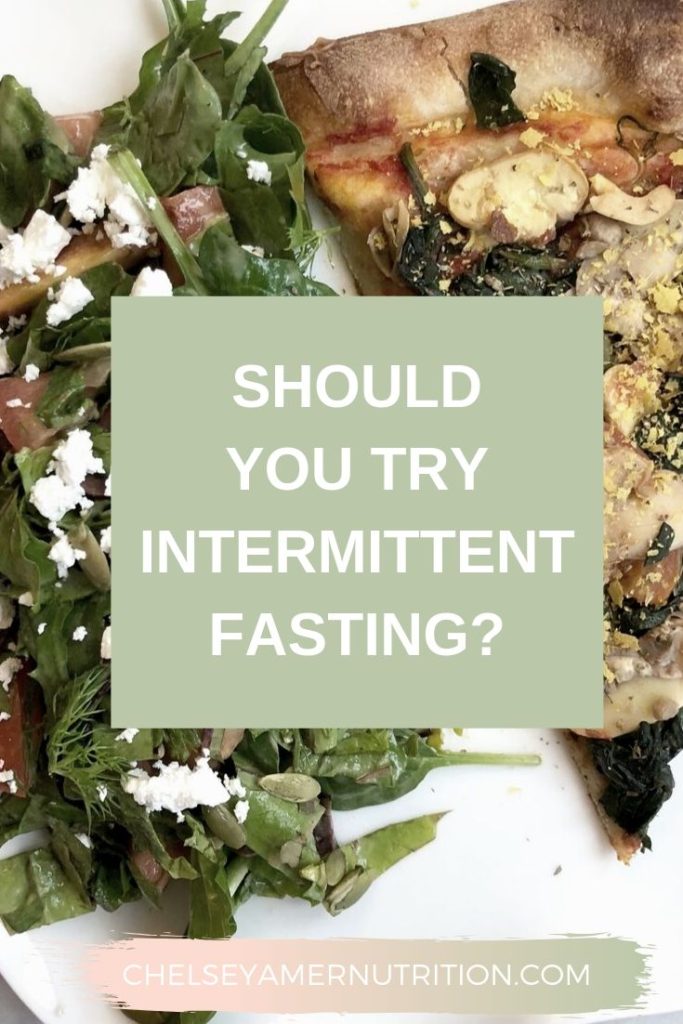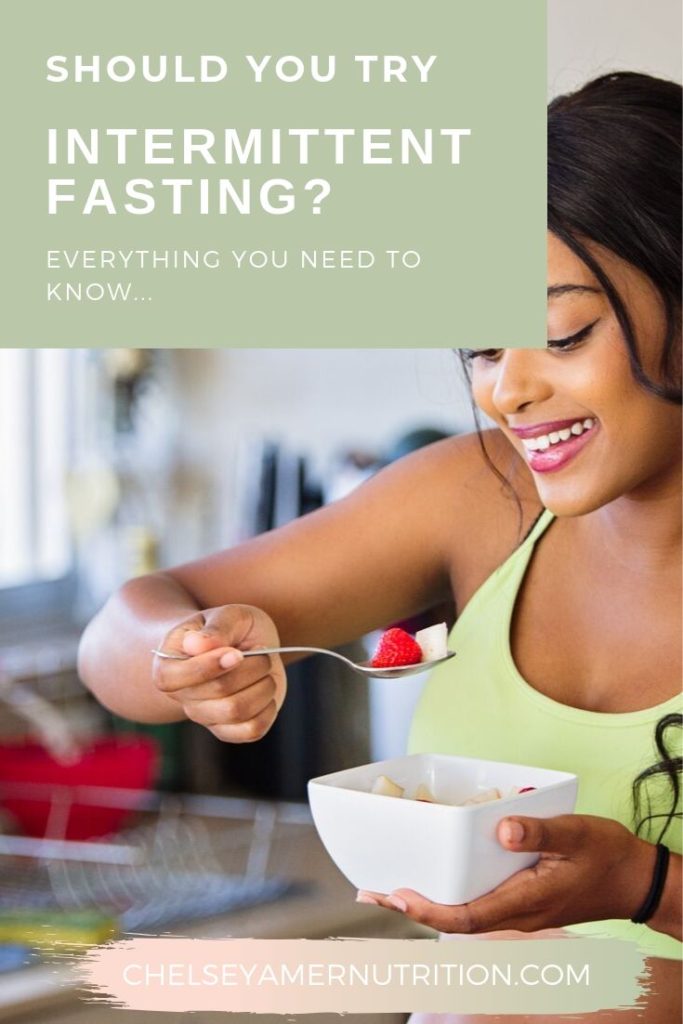Should You Try Intermittent Fasting?
One of the hottest trends in the nutrition field is INTERMITTENT FASTING. But should you try intermittent fasting? How do you know if it’s right for you? Read on…

I’m jumping right into things today because we have a LOADED topic that many of you asked about: INTERMITTENT FASTING (IF)! Fasting is a hot topic in the nutrition world, so I want to get to the details, the facts, and the fiction.
Should you try intermittent fasting?
First, let’s take a look at what IF really is, what the research says, and if it’s something that could work for your goals…
What is intermittent fasting?
Intermittent fasting is a PATTERN of eating. It’s not a diet, but instead restricts the length of TIME you consume your calories (aka energy).
Yes, there’s still restriction involved, which doesn’t work for a lot of people, HOWEVER, it can be done without feeling the restriction because you may be sleeping for a large majority of the time you’re not eating (in the time-restricted method – see below!).
What are the benefits of intermittent fasting?
When you give your body a break from eating (during your fast), your body should rely on fat stores for energy. This can lead to easier weight control (if needed).
Additional evidence-based benefits are:
- Improved blood sugar control and insulin sensitivity
- Lower blood pressure
- Decreased appetite
Anecdotal benefits also include less bloat, more energy, mental clarity, and less stress about what to eat in the morning.
Fasting has been around for FOREVER (we’re talking back to the days of Plato and Socrates), so it’s not exactly a new concept.
How do you do it?
There are 2 types of intermittent fasting:
- 5:2 method: You consume VERY LITTLE calories (25% of your daily needs) on 2 non-consecutive days of the week and eat your normal diet on the other 5 days. This could mean if your daily needs are 1800 calories, you’d only eat 450 calories on your 2 fasting days.
- Alternate day fasting: You alternate days of consuming 25% of your daily needs and “normal” days.
- Time-restricted or 16:8 method: You eat during your 8 hour window, fast for the remaining 16 hours of the day (of which 8 you should be sleeping!!!).
- Time-restricted 12:12 method: You fast for 12 hours and have a 12 hour eating window.
There are pros and cons to both methods, however, for most people, the time-restricted method is likely more doable (especially a 12:12 method).
Since this is not a detailed diet plan, you can eat ANYTHING you want during your feeding window, no restrictions!
What does the research say?
- You could lose weight from intermittent fasting. A recent (small) study compared a group of overweight individuals who ate from 8am to 2pm and a group who ate from 8am to 8pm. Both ate the same amount of calories and macronutrient breakdown. The group with the shorter eating window lost more weight, possibly due to reduced appetite. These results have been replicated in many studies.
- You could improve insulin sensitivity, reducing your risk of diabetes. A 2011 study demonstrated the metabolic benefits of fasting, including improved insulin sensitivity, blood pressure, oxidative stress and appetite.
Should you try intermittent fasting?
With all of these benefits, what’s the catch?
You’re still RESTRICTING something (even if it’s not the type of food you eat). Yes, technically you can eat ice cream everyday during your feeding window… but what if you want ice cream OUTSIDE of your feeding window? What if you wake up hungry?
You don’t need restriction for long-term weight loss. There are other tips, tricks, and techniques (*cough* balancing your plate *cough*) to use that may be more doable and sustainable for you.
Give it a try if you’re…
- Interested
- Not hungry in the morning
- Wake up bloated and have tried other modalities that don’t work
I highly suggest if you have ANY medical condition or take ANY medication that you work with a qualified professional to see if intermittent fasting could work for you.
Skip it if you’re…
- Pregnant
- Breastfeeding
- Ravenous in the morning
- Diabetic (unless you’re working with a professional!)
- Prone to fainting
- Have a history of disordered eating or an eating disorder

The takeaway on if you should try Intermittent Fasting…
Overall, my advice about intermittent fasting is like most things when it comes to nutrition – DO YOU! You know your body best and know if intermittent fasting may help you. (And if you want help figuring it out, schedule your free initial consultation!)
Personally, I find following my hunger and fullness cues to be a more satisfying and sustainable way of eating. Some days I wake up hungry for breakfast at 7am, other days I wait until 9:30am to eat. I’m a morning eater. You may not be hungry until 1pm most days, and in that case I’d say you don’t have to eat before then if you otherwise feel OK!
See – it’s all about what works FOR YOU! (Is it catching on?!)
And of course, keep in mind that there are other ways to maintain a healthy weight for your body, improve insulin sensitivity, reduce your blood pressure, boost your energy, and de-bloat than intermittent fasting!!! This is just one method that COULD work and is rising in popularity, so I thought you should know about it!
Questions? Concerns? Have you tried it before? I want to hear from you!
XO


 Hi there!
Thanks for stopping by! I'm Chelsey, an online Registered Dietitian, recipe developer, budding photographer, and coffee addict! My mission is to help you feel good through food by answering the question "What should I eat?" Let's make nutrition approachable!
I hope you enjoy my personal collection of simple, healthy, food allergy friendly and nutritiously delicious recipes, plus tips and tons of tricks that will help YOU live a nutritionally-balanced life! I look forward to getting to know you better...
Hi there!
Thanks for stopping by! I'm Chelsey, an online Registered Dietitian, recipe developer, budding photographer, and coffee addict! My mission is to help you feel good through food by answering the question "What should I eat?" Let's make nutrition approachable!
I hope you enjoy my personal collection of simple, healthy, food allergy friendly and nutritiously delicious recipes, plus tips and tons of tricks that will help YOU live a nutritionally-balanced life! I look forward to getting to know you better...







